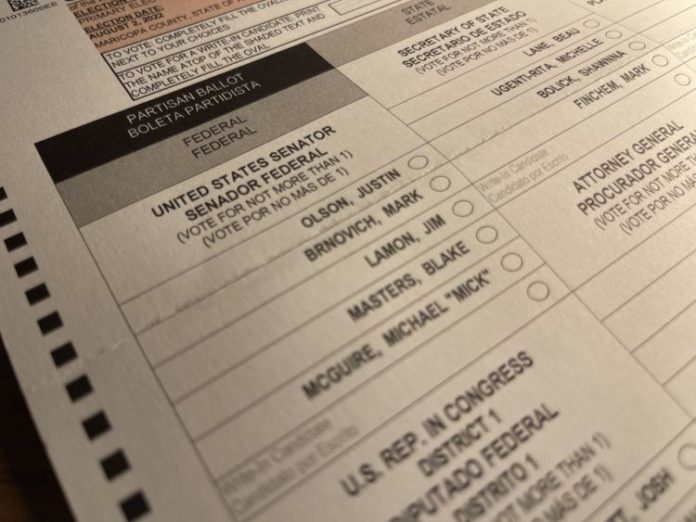The architect of most of Arizona’s voter reforms over the last decade says a claim that her reforms to the state’s early voter list will restrict ballot access for minorities makes some irresponsible assumptions.
The nonprofit Brennan Center for Justice at New York University’s School of Law released a study saying minorities are most likely to be removed from Arizona’s Active Early Voter List after Senate Bill 1485 takes effect.
Enacted in May 2021, the legislation changes the state’s popular Permanent Early Voter List so that a voter receives a postcard asking if they would like to remain on the list if they don’t mail in a ballot in two consecutive election cycles.
It’s only after the voter doesn’t affirmatively respond to that postcard that they would be removed from the list.
An average of two-thirds of Arizona’s voters do so by mail.
The change doesn’t take effect until after the November midterm elections, but Brennan Center experts Kevin Morris and Peter Miller predict that Black, Latino, and Native Americans will be disproportionately affected.
“About 11.6% of voters – or more than 340,000 Arizonans – are at risk of being removed, but there are clear racial disparities. While just 8.4% of white voters on the list went four years without voting by mail, this was the case for more than 21.1% of Latino voters.
To divine which voters are a member of a minority race, the authors use Bayesian Improved Surname Geocoding, a common method that they said predicts race/ethnicity based on each voter’s last name and the demographics of the census block in which they live.
State Sen. Michelle Ugenti-Rita, the Scottsdale Republican who authored SB 1485, takes exception to the criticism of the law she ushered through the legislative process.
“The whole thing is based on assumptions,” she said of the study. “It’s all based off of broad-based assumptions about the make up of who they think is going to fall off. You have to assume many things to get to disenfranchisement.”
Ugenti-Rita said, and the study authors acknowledge, that voters would have to do more than skip a few elections to be removed from the list.
“They have to assume that that population might miss the notice in an effort by the state to warn them,” she told The Center Square, pointing out the study’s assumption that voters rely on the mail to cast a ballot but can’t be relied on to receive the state’s postcard.
“They signed up for a vote by mail system. All of a sudden, receiving the notice is burdensome,” she said. “They’re criticizing the very system that they say is too weak to send that notice. Either it’s secure and reliable, or it’s not. You can’t have it both ways.”
Whether the law disenfranchises voters may not matter if activists can keep their Arizona Election and Voting Policies Initiative on the November ballot.
Should it survive a court challenge and voters approve of it, the measure would undo most of the election reforms put in place by the Republican Legislature over the last two years. That would include SB 1485.
“It would be devastating for Arizona’s elections,” Ugenti-Rita said.
The initiative is facing an existential threat. The Arizona Free Enterprise Club has successfully challenged enough signatures turned in by supporters that a lawyer representing the organization estimated Friday that the measure would likely fall 10,000 signatures short of making the ballot.
Republished with the permission of The Center Square.















